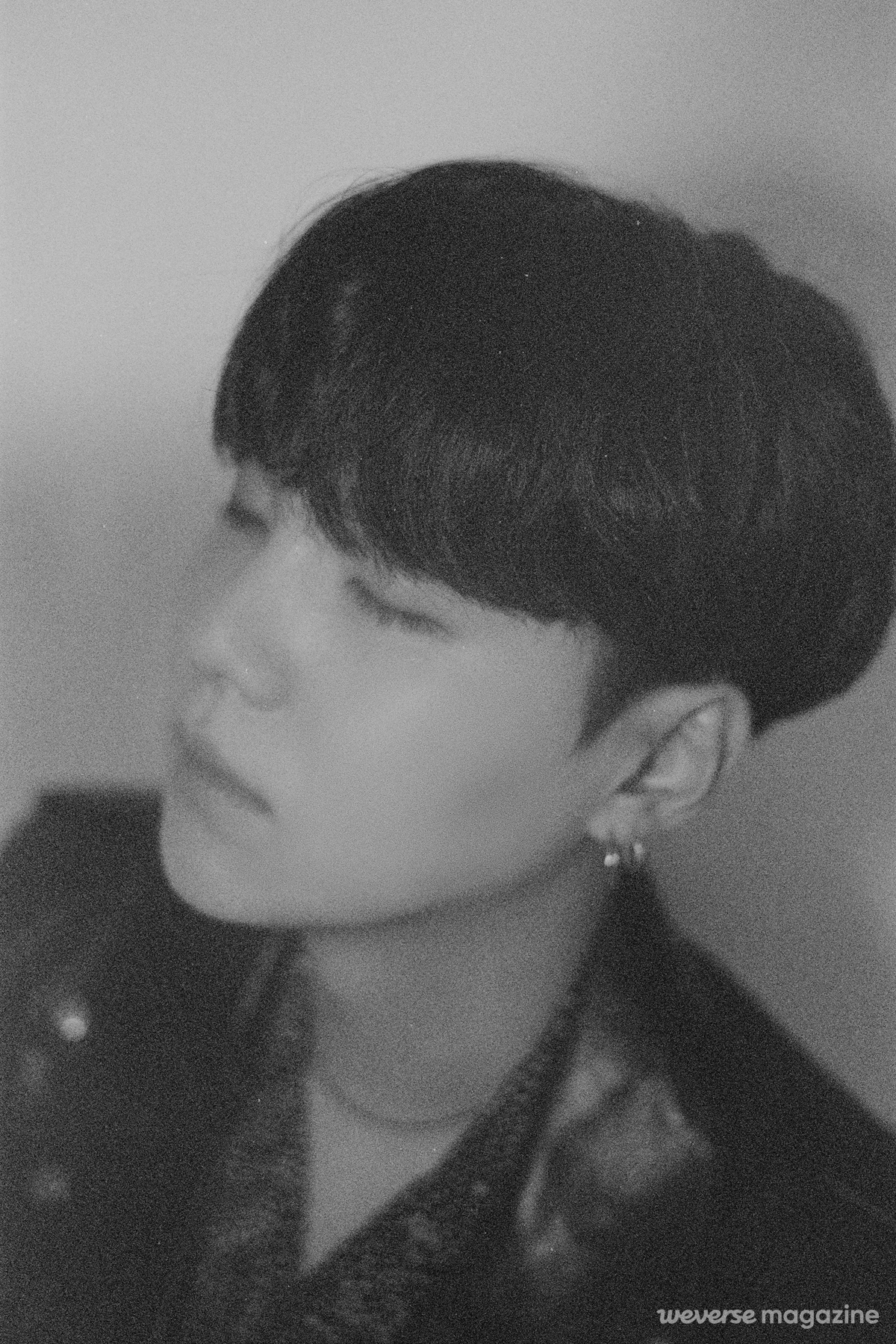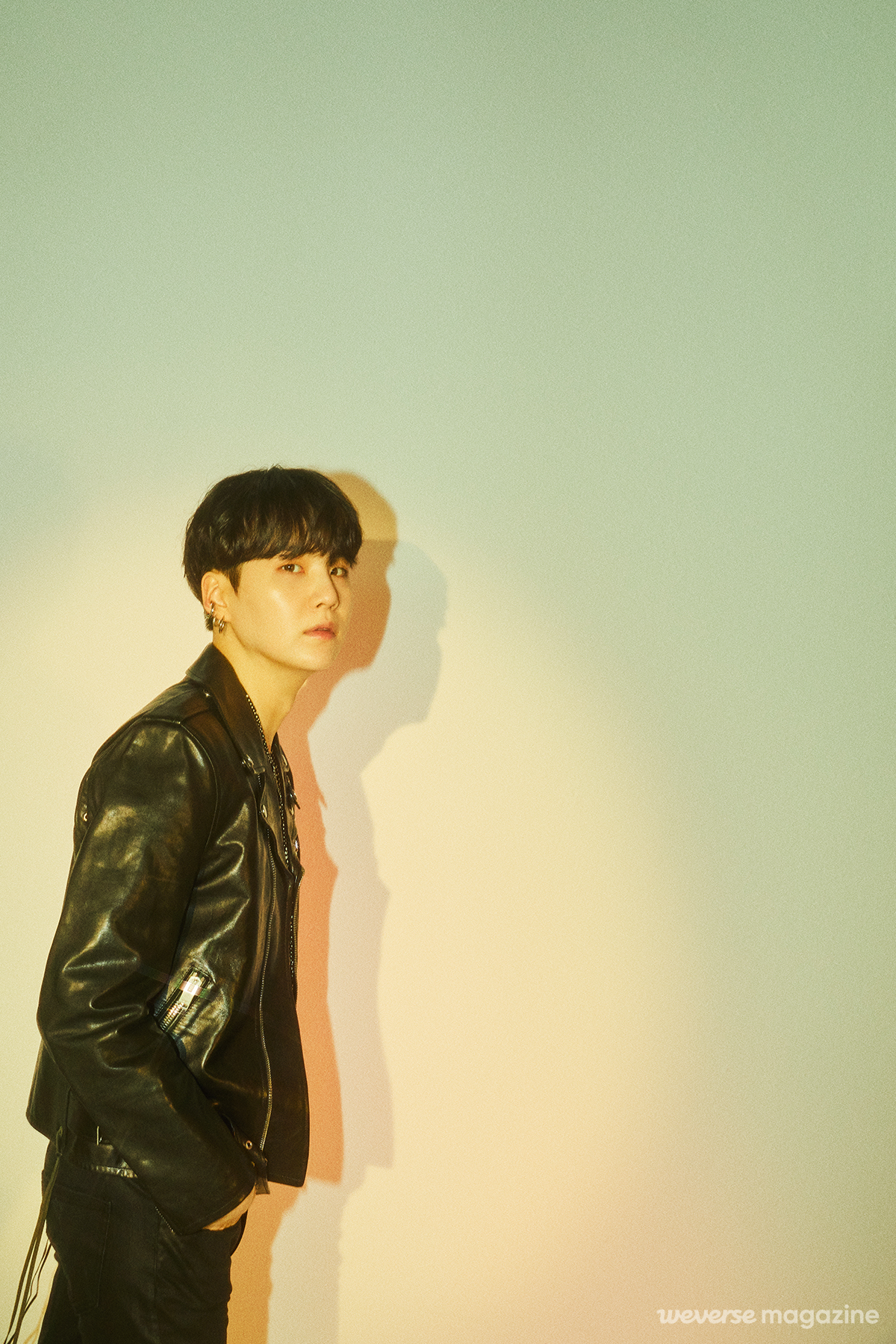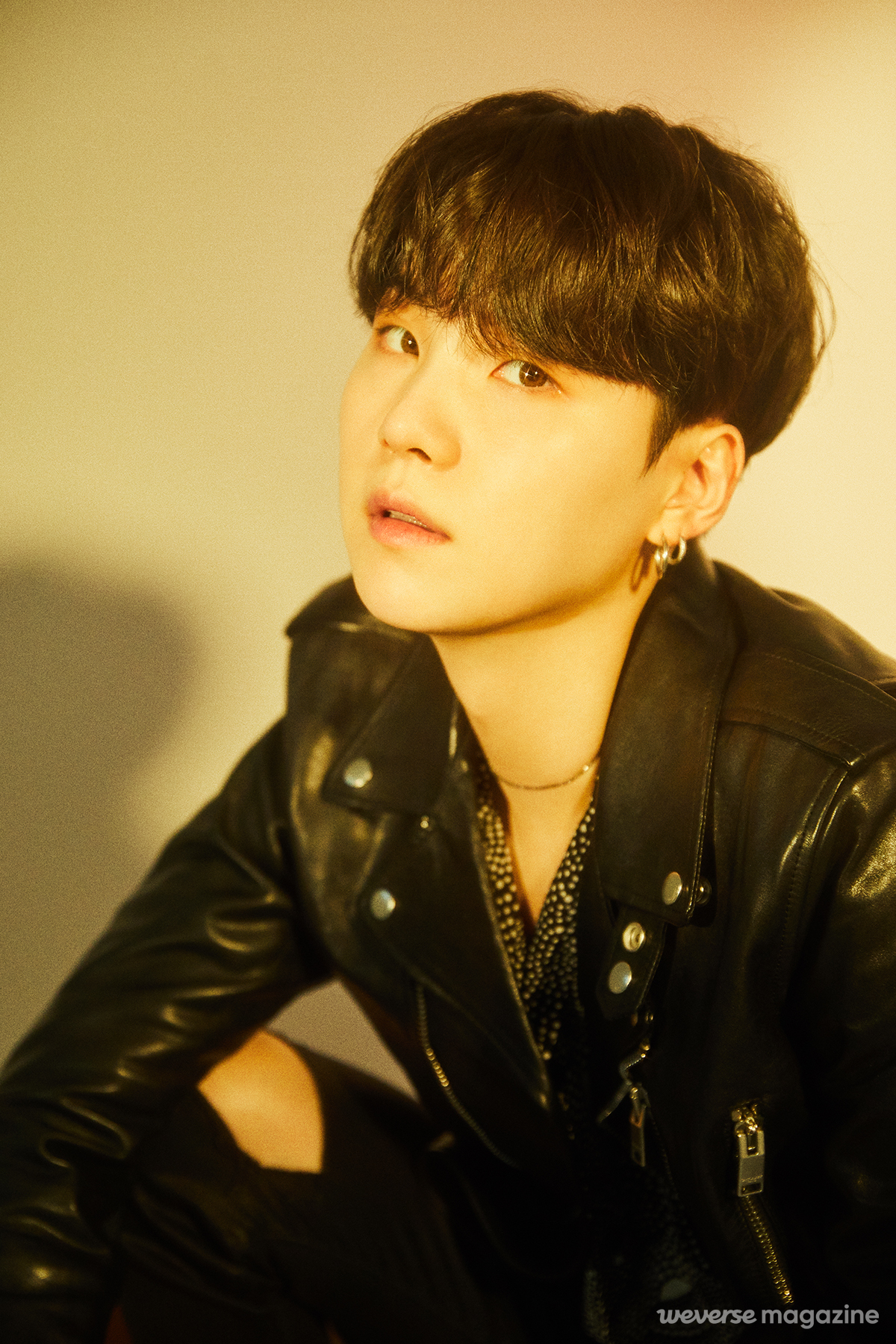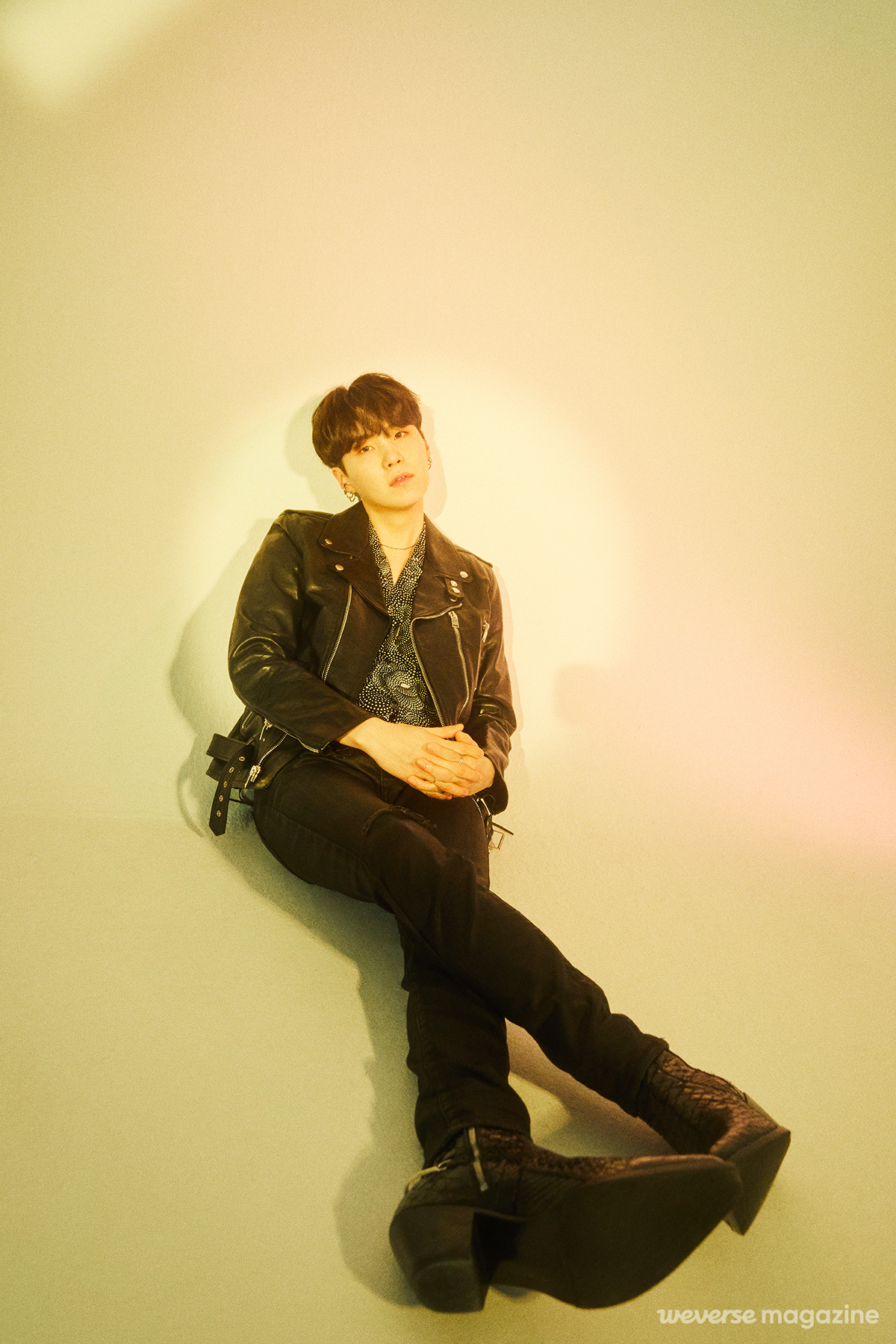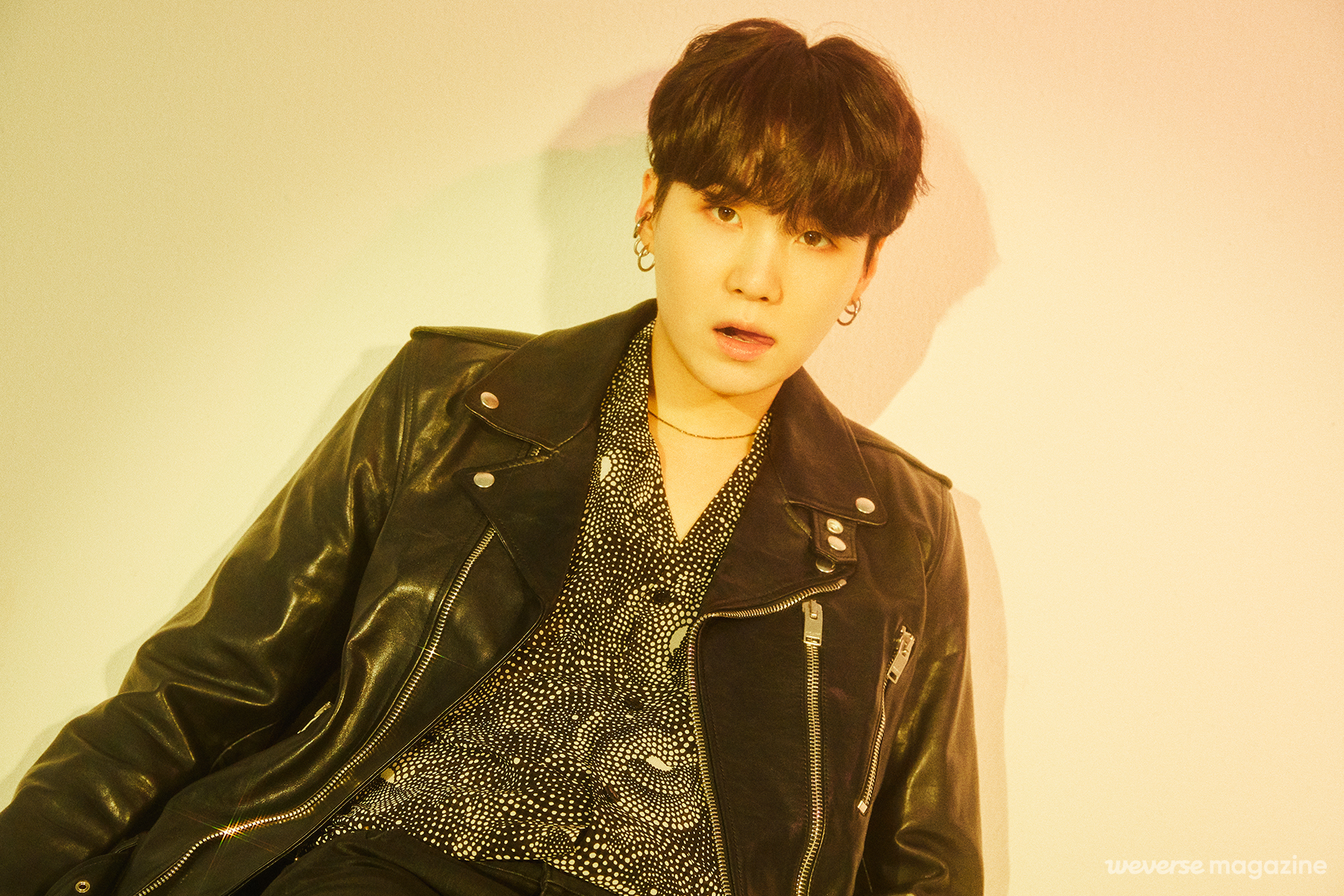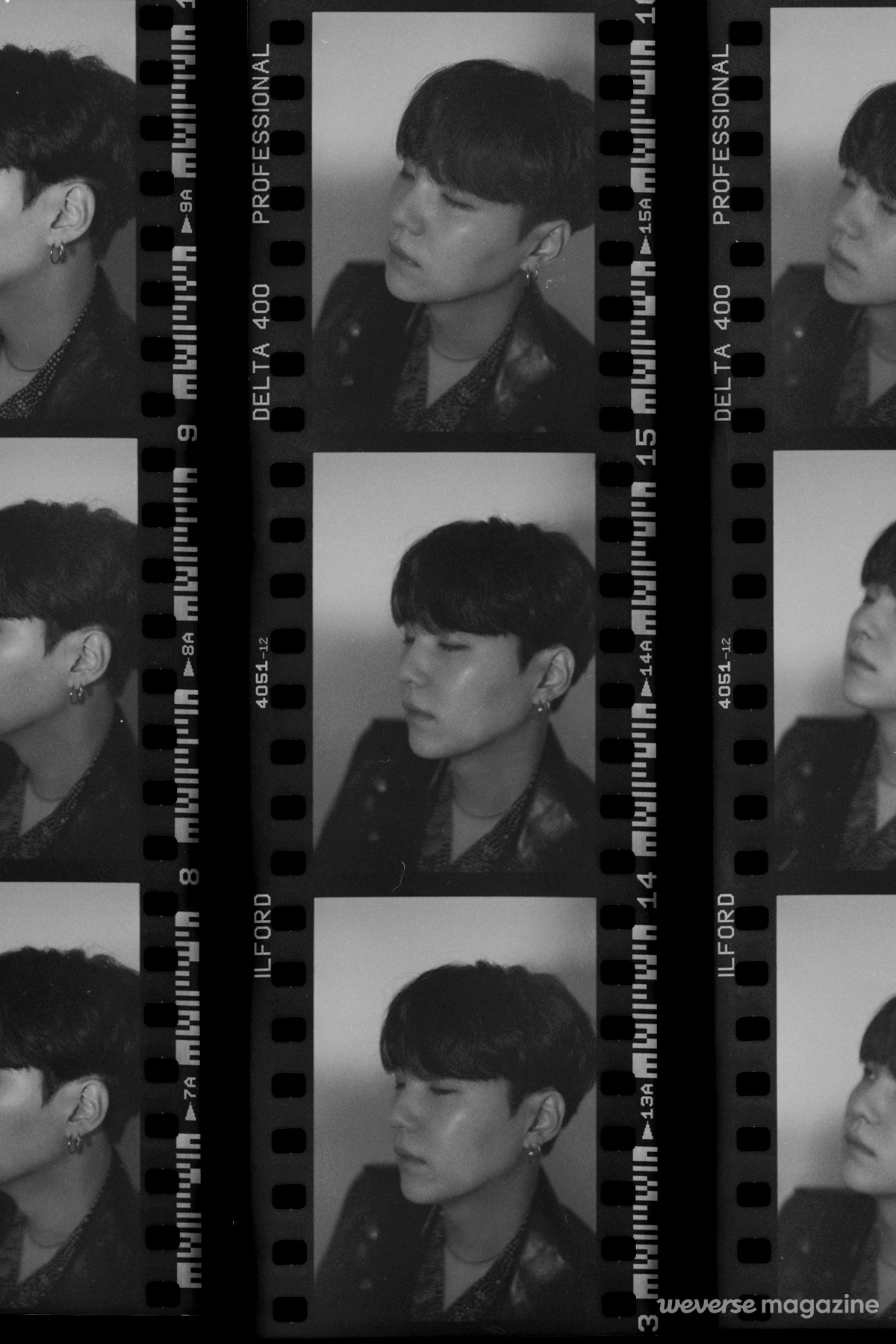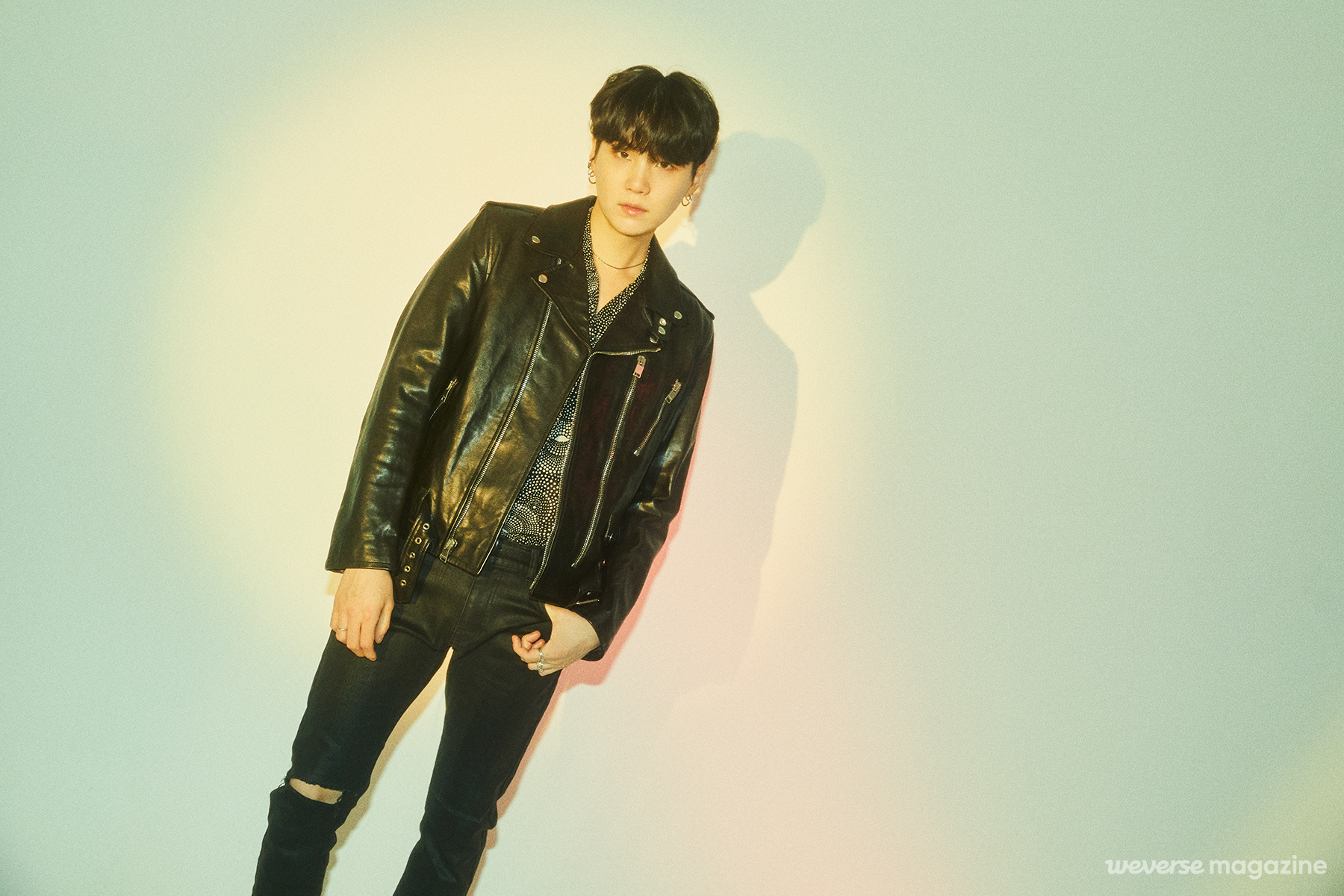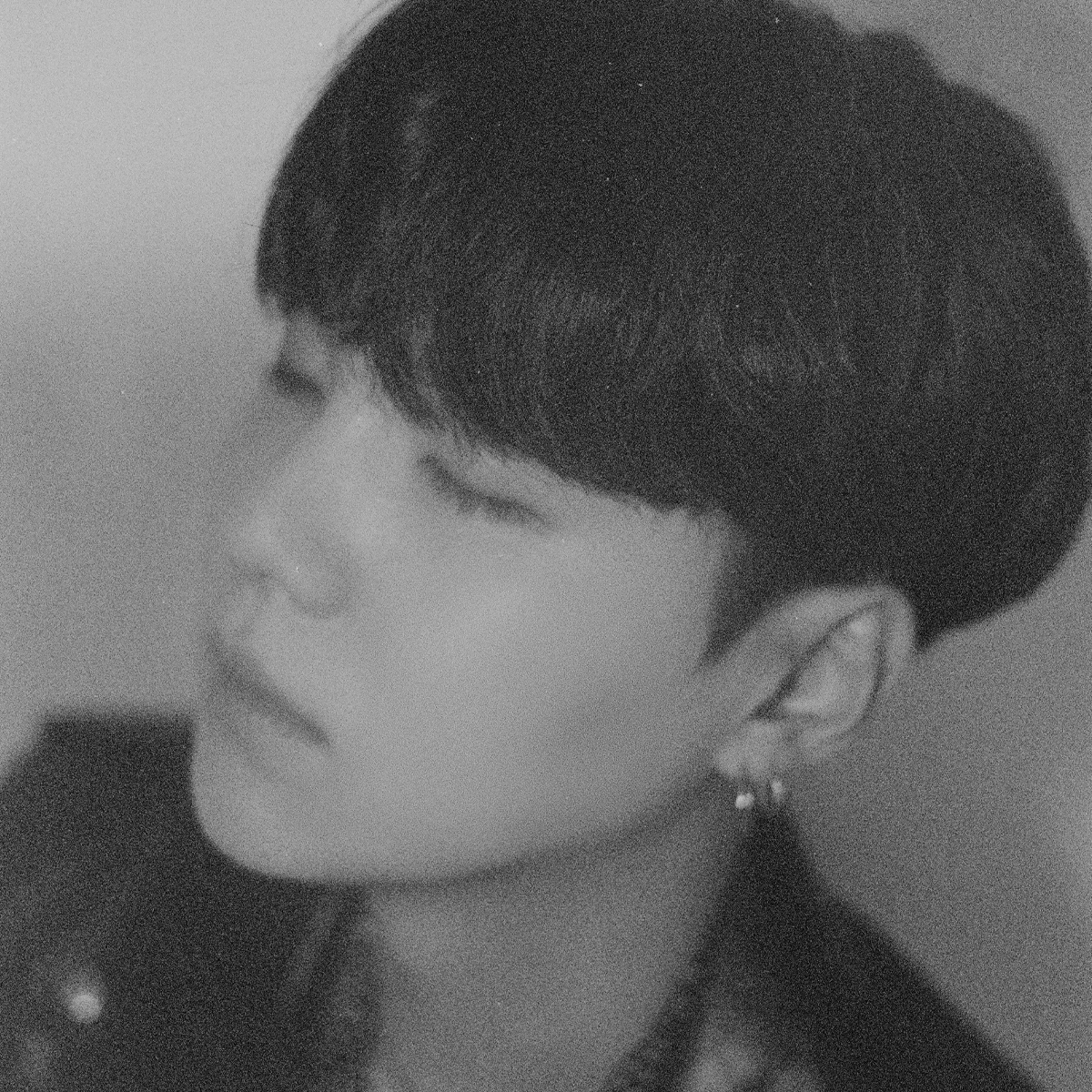
How is your shoulder?
SUGA: Good. I think it’ll get even better once I take off this brace. Apparently, it takes several months for a full recovery, but I'm trying to get better as fast as possible.
How does it feel like to have resolved a problem that has distressed you for long?
SUGA: First of all, I'm glad. The pain is one thing, but when my shoulders got worse, I couldn't even raise my arms. But when I heard that this might recur when getting the surgery at a young age, I waited for the right time and had decided to get it done early next year regardless of the COVID-19 situation. I had planned to get the surgery after the year-end stages, but I got it done this year (2020) because my doctors advised me to start preparing early for next year’s promotions and activities.
How does it feel like watching the other members doing promotions?
SUGA: I can't say it feels great. I could see the emptiness because we've been together as a group of seven for so long. Not necessarily because I'm not there but because something that should be there is missing?
Is that what made you join the promotion as much as possible? You shot lots of video footage in advance and you even appeared in the Mnet “2020 MAMA” through VR.
SUGA: Fake SUGA (Laughs). There’s this 3D studio where we shot it. I shot, scanned, and acted there, but couldn't see the actual result at the studio. I thought a sense of displacement was unavoidable, and that was exactly the case. (Laughs) I acted normal because it would have been aired anyway even if I hadn’t had the surgery, but it seems a lot because it’s aired after the surgery.
You must feel restricted not being able to go on stage.
SUGA: The thing is, it's only been a month after I got surgery, but my absence on stage is so apparent. But my doctors keep telling me that I shouldn't be impatient and in fact, many athletes get a resurgery when they return to the field without proper rehabilitation. So I'm working on trying to care less. For the first two weeks after surgery, I felt so frustrated that I tried out new things. I even watched movies I didn't watch.
SUGA: I watched ‘Samjin Company English Class’ as it happened to be on IPTV, and now I have ‘Tenet’ on my list. ‘Parasite’ was the last movie I saw at a cinema. As the social distancing measures became stricter, I haven’t been going outside, except going to the hospital. I even eat at home. I'm also watching a lot of TV nowadays. Watching music shows like ‘Sing Again’, ‘Folk Us’, and ‘Show Me The Money 9’ made me think of what I should do in the upcoming days.
Could you elaborate on that?
SUGA: A lot of candidates on ‘Sing Again’ are very talented but hadn't had the opportunity, and on ‘Folk Us’, I noticed that many took their own guitars on stage. I started playing the guitar lately and I'm having this urge to broaden my scope of music. And since my interest in the music industry in the U.S. grew, I'm getting prepared, studying English and all.
What fueled your interest?
SUGA: In some ways it’s the most commercially developed market. You could lose the industry attention in a flash if it's not feasible. So in this system, you would try everything and that would be an efficient way. I want to do music for a long time, and to this end, I always want to learn more about the global music industry because I want to do music that’s loved not only in Korea, but also in the U.S., Japan and Europe.
Speaking of which, it seems BE was influenced from music of the past rather than today's trends.
SUGA: I especially like impromptu music. I love the songs that were made in one take instead of being recorded several times. In this era of crossover genres, the desire to do better in music is growing inside me.
As the genres become more blended, the melody you use must be more important. Does starting to play the guitar affect your composing in any way?
SUGA: I always liked using guitar sounds. And I have always liked the Eagles. If you play the guitar, it’s way easier to write songs because you can carry it along wherever you go, pluck on the strings to create melody lines. Keyboards are difficult to carry around. (Laughs) I usually work on my laptop but I had this thought that I definitely needed an instrument. It accelerates my work and improves my understanding of chords.
It makes me think you could intuitively make melodies.
SUGA: It’s easier to write a song because you can intuitively make a progression and try many different things. During my work on ‘Eight’, IU had recorded and sent me a song from her phone. At the time I couldn’t play the guitar, so we tried to make sure we’re working on the same page when keeping track of each other's progress. That made me feel the need to learn an instrument.
SUGA: I tried a melody for the first time this year (2020), and as I started knowing the fun of music, it opened a lot of new doors for me. So it was kind of easy working on it. I just played a beat and wrote from the beginning until the end. Done. I wrote it in just 30 minutes. The song almost wrote itself. The trends of pop and hip-hop these days cross boundaries between vocals and rap. I like this trend.
When I listen to your singing, it feels like you’re hitting the beats rather than singing along the notes. So I thought perhaps you're singing as if you're rapping.
SUGA: When you're rapping, you just think of the rhythm, so it’s like simply putting on a melody to a rhythm. To define which comes first, I think melody adds to it while writing the rap.
In ‘Life Goes On’, the lyrics ‘Thankfully between you and me, nothing’s changed’ are somewhere in between. It's not rap but it’d be mundane to say it's a mere melody.
SUGA: There are obviously songs where the rap needs to be highlighted. For example, in ‘Dis-ease’ or ‘Ugh!’, you have to be good at rap. But in songs that should be easy to listen to, impressive raps are not always the way to go. Sometimes, you want smooth transitions without obstacles.
In that sense, the rap flow of ‘Blue & Grey’ was impressive. Rather than a dramatic effect that emphasizes each part, you extended the rap just as much as the slowing beat.
SUGA: To be honest, this beat is difficult to rap to. The beginning of the song only has a guitar line, which made it even more difficult. I participated when we wrote lyrics for ‘Blue & Grey’ and I've always wanted to work on a song like this. It was because verse 1 talks about the theme of the song.
SUGA: I think it took less than a week to make my part in the album. After having written one or two melodies for ‘Life Goes On’, I wrote a version complete with rap, and liked it that I even worked on a separate arrangement and lyrics. Rather than pondering over the ways that might work, I choose to simply play the music and write.
Many creators are unsure even after they’ve produced good work. How do you get the conviction to release your work?
SUGA: Many musicians are unsure whether they should release their music or not. It was the same for me, but the thing is, you’ll never release anything if you nitpick everything. For example, if we release 10 songs, we have a chance to unveil them in concerts or fan events. And sometimes, as we listen to the song, we think, ‘Why does this part that had bothered me no longer bother me?’ Some things might feel awkward at some point, but in time, it no longer feels awkward. Even I forget about it. So it's more efficient to fine tune, looking at the big picture, rather than thinking too much about the details. On top of that, during promotions, I don’t have the time to pick tracks that others have sent for 10 hours. It would be a success for all of us if each of us play and write a melody in their own time and collaborate with others on the details. So the way of songwriting has evolved in many aspects.
What motivated such evolution?
SUGA: I think it evolved naturally. I've changed in personality this year (2020), as well as in terms of my interpretation and attitude toward life to the extent that I almost thought I've been rehearsing. How would it feel like if there were no stage to go to or anyone looking out for me? This thought made me realize the value of these things.
In ‘Dis-ease’, you sing ‘I don’t know if it’s the world that's sick’. Was it this lifestyle that changed your thoughts about your work?
SUGA: Yes. When I was young, I had embraced the belief that ‘It must be my fault’, but as I got older, I realized that this is not always true. Most of what I had thought was my fault was in fact, not my fault. On the other hand, there are things that I did well and times I had been lucky.
‘I NEED U’ came out during a time when you were still thinking, “It must be me”. After the members put on a stage with ‘I NEED U’ in KBS' ‘Song Festival’, you wrote on Weverse, “It’s the same as five years ago.” How would you compare with back then? (This interview was held on December 19, 2020.)
SUGA: We've matured quite a bit. And our stage performances have become more natural. I still like ‘I NEED U’. Just listening to the beat makes me sentimental, and above all, the song came out nicely. So as I was watching this and that when I stumbled across old videos. Watching them made me think that we haven’t changed much.
SUGA: Before the social distancing measures got stricter, I talked with the photographer for BE, whom I had met four years ago. The photographer was surprised that we hadn’t changed much after all the success, even though he had assumed we’d be very different.
I'm amazed personally. I’ve had the chance to meet the members before your debut, but from your way of talking with members or others, it seems you haven't changed.
SUGA: I think it's because we don’t give it a big deal about success. For example, it's incredible to be ranked first on the Billboards, but there’s also this sense of, “Okay, and?”
Even the Grammys? (Laughs)
SUGA: When we got nominated for the Grammy Awards, we thought, ‘Is this real?’ (Laughs) Of course we were delighted, but it didn’t make us think, ‘We're singers nominated for the Grammy.’ If you're nominated, you're nominated, and if you get the award, you get the award. You don't get shaken by that. I know it's a great award and would be so grateful if we receive it, but we know that nothing is possible without the tremendous support of our fans. What’s more important is that the fans are more flattered than us when we receive a great award. So everyone's rejoicing, but it’s like, ‘Let's do what we have to do.’ We've been training ourselves to keep finding our places, so no one remains overexcited.
In ‘Fly To My Room’, there are lyrics that say, ‘This room is too small to contain my dream’, and ‘Sometimes this room becomes an emotional trash can, but it embraces me.’ I had this feeling that the room had been such a place and that you were accepting that you have changed. Then the essence must have remained the same.
SUGA: It wasn’t easy to accept that we eventually change. But I think it's a good thing that we changed. What we did back then was possible only at that time, and we could change because of the things we had accomplished.
Then, what new things are you dreaming about?
SUGA: I'm eager to continue doing music. Since all performances were canceled due to COVID-19, I had a chance to talk to so many musicians in Korea. I talked with legendary singers as well as people who are my contemporaries. Talking with them once again made me realize that I love music so much. Because music is my profession, I can’t imagine myself not doing it. I'm grateful that there are still unvisited areas in the world of music.
SUGA: I was greatly motivated when I saw the concert of Na Hoon-a last Chuseok . I wondered how many musicians would actually be able perform and write music for so long like he has. At that moment, it occurred to be that ‘I want to be like him’. He has passion and desire, and most of all, he is a superstar. A few years ago, I took my parents to a Na Hoon-a concert, and when they watched the performance last Chuseok, they said it was way less impressive to see him perform through the TV. (Laughs)
That must explain your interest in a broader spectrum of music from instruments to composing and musical genres. Because you want to be doing this for a long time.
SUGA: My goal is to continue doing music in any shape or form. In that sense, I have this great respect toward Cho Yong-pil. He takes the best sound there is and reinterprets it into his own. I think that’s something I want to emulate and keep changing and evolving so that I can continue doing music for decades to come.
The lyrics ‘Thankfully between you and me nothing’s changed’ must sound more meaningful for the fans because they will be listening to your music for a long time.
SUGA: A month and a half in the current times must seem like a lifetime for the fans when we're far apart. I feel the same. But I think that's proof that we worked hard for the past seven years and that the fans have been passionately reaching out to us. I'm striving to get to them as fast as I can, and I'm eager to go on stage. I'm going through this because I want to be better on stage in a better condition, so don't be sad, and please hang in there a little longer.
Unauthorized reproduction and distribution prohibited.
